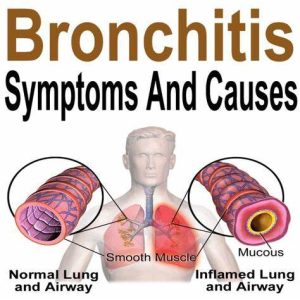Bronchitis is the inflammation of the bronchial tubes, which help in the passage of air to and from the lungs. It can be acute (short-term) or chronic (long-lasting). Let’s explore the best medicine, treatment, and prevention strategies for bronchitis:

Symptoms of Bronchitis:
- Long-Lasting Cough: A persistent cough with thick mucus is a common symptom.
- Difficulty in Breathing: You may experience shortness of breath.
- Fatigue: Feeling tired or weak.
- Chest Discomfort: Discomfort or tightness in the chest.
- Fever: Sometimes accompanied by fever.
- Diagnosis and Treatment:
- During the first few days of illness, it can be challenging to distinguish bronchitis symptoms from those of a common cold. Your doctor may perform the following tests:
- Chest X-ray: This helps determine if you have pneumonia or another condition that may explain your cough.
- Sputum Tests: Analyzing the mucus you cough up can reveal illnesses that might benefit from antibiotics.
- Pulmonary Function Test: Using a spirometer, this test checks for signs of asthma or emphysema.
- Medications:
- Antibiotics: Most cases of acute bronchitis are caused by viruses, so antibiotics aren’t usually effective. However, if your doctor suspects a bacterial infection, they may prescribe an antibiotic.
- Cough Medicine: If your cough disrupts your sleep, consider using cough suppressants at bedtime.
- Other Medications: For allergies, asthma, or chronic obstructive pulmonary disease (COPD), inhalers and other medications can reduce inflammation and open narrowed air passages in your lungs.
- Therapies:
- Pulmonary Rehabilitation: If you have chronic bronchitis, a respiratory therapist can teach you breathing exercises to improve lung function and enhance your ability to exercise.
- During the first few days of illness, it can be challenging to distinguish bronchitis symptoms from those of a common cold. Your doctor may perform the following tests:
- Prevention:
- Avoid Smoking and Secondhand Smoke: Smoking is a major risk factor for bronchitis.
- Hand Hygiene: Wash your hands frequently to prevent infections.
- Flu Vaccine: Get a flu vaccine annually.
- Minimize Exposure to Irritants: Avoid dust, fumes, and other lung irritants.
Remember to seek medical attention if your symptoms are severe, persistent, or if you experience difficulty breathing, chest pain, or coughing up yellow or green mucus. Take care and follow your doctor’s advice!



